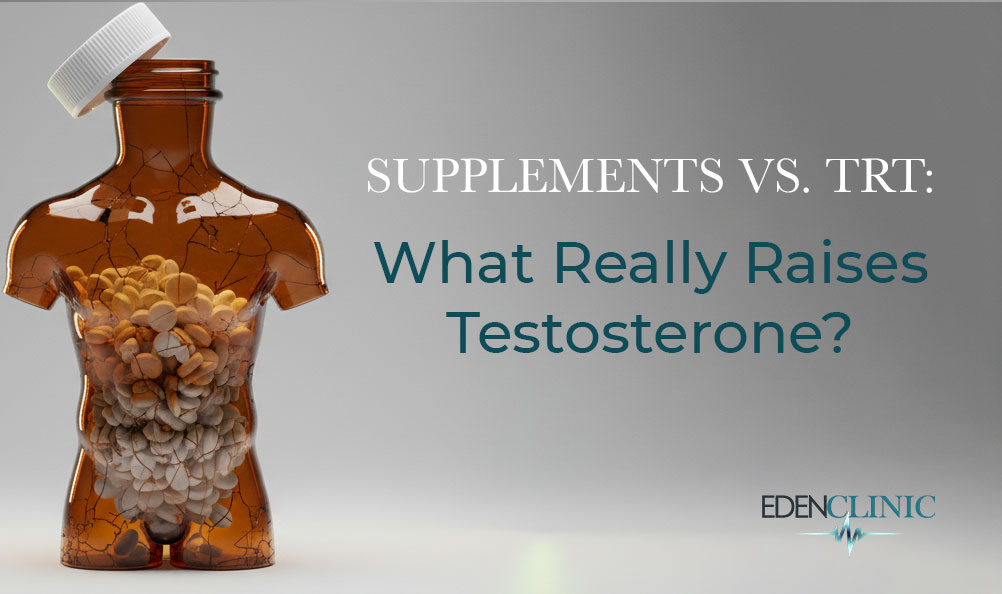Supplements vs. TRT: What Really Raises Testosterone?

Short answer: supplements can help if you’re deficient—but they are not a substitute for a proper medical assessment and, where appropriate, doctor-led TRT. Below we summarise what the research generally shows and how Eden Clinic approaches low testosterone safely.
Key takeaways
- Correcting vitamin D, magnesium, and zinc when you’re low may produce modest improvements in testosterone for some men; results vary person to person.
- Certain botanicals (e.g., ashwagandha, Tongkat Ali) can help selected individuals—quality and standardisation matter.
- Boron may lower SHBG in some men, nudging free testosterone up; evidence is early-stage.
- Shilajit has some promising data but product quality and contamination risk are concerns—medical oversight is recommended.
- If symptoms and bloods confirm hypogonadism, TRT treats the root cause and is delivered with monitoring at Eden Clinic.
Start with the basics: test, don’t guess
At Eden Clinic we begin with symptoms + comprehensive bloods (total and free testosterone, SHBG, LH/FSH, prolactin, thyroid panel, vitamin D and more). We correct lifestyle and micronutrient gaps first; if clinically indicated, we discuss doctor-led TRT with ongoing follow-up. This avoids guesswork and “supplement roulette.”
Ready for clarity? Book a TRT assessment (blood tests + 30-min doctor review).
What the evidence generally suggests
Vitamin D
Low vitamin D is commonly associated with lower testosterone. Randomised trials are mixed: some show small increases with repletion, others show no meaningful change. Bottom line: replete if you’re deficient for overall health; don’t expect large testosterone jumps for everyone.
Magnesium
Magnesium status is linked to anabolic hormones. Small trials suggest increases in free/total testosterone, especially alongside exercise. We check your levels and diet before recommending targeted doses.
Zinc
Zinc deficiency is a known cause of low testosterone; correcting it helps restore normal levels. For men without deficiency, “extra” zinc is unlikely to boost T further. We use targeted dosing only when labs and diet indicate a gap.
Ashwagandha (Withania somnifera)
Trials using standardised extracts (e.g., KSM-66®, Sensoril®, Shoden®) report modest improvements in testosterone and in stress/sleep metrics. Effects likely relate to cortisol/HPA-axis modulation; not everyone benefits, and overdoing it can blunt affect in susceptible individuals. Product quality and dose matter.
Tongkat Ali (Eurycoma longifolia)
Systematic reviews suggest Tongkat Ali can increase total testosterone in some men, including those with low levels. Look for products with HPLC-verified eurycomanone (avoid vague “200:1” claims). We only consider it after basics are optimised and if it suits your profile.
Boron
Short studies show reductions in SHBG and small increases in free testosterone after boron supplementation. Think of it as a fine-tuning adjunct, not a replacement for medical care. Dosing and monitoring matter.
Shilajit
A 90-day study in middle-aged men reported increases in total and free testosterone and DHEA-S with purified shilajit. However, quality varies widely and some market products have been found contaminated. Only consider purified, tested products under clinical guidance.
What about popular “test boosters”?
Compounds like tribulus, D-aspartic acid, and fenugreek have weak or inconsistent evidence for meaningfully raising testosterone in men. We don’t recommend them as a primary strategy.
When supplements aren’t enough: TRT at Eden Clinic
If your labs and symptoms indicate true testosterone deficiency, supplements won’t fix the underlying problem. Eden Clinic provides doctor-led TRT with a structured care pathway:
- Diagnostic blood tests and medical assessment
- Personalised plan (including sleep, training, nutrition, weight, alcohol and stress)
- TRT, if indicated, with careful monitoring (symptoms, labs, safety markers)
- Regular follow-ups to fine-tune dose and keep you well
Next step: Book your TRT assessment to get a clear, personalised plan.
FAQs
Will supplements replace TRT?
No. Supplements may fine-tune hormones if you’re deficient; TRT treats confirmed hypogonadism under medical supervision.
Can I just take vitamin D or magnesium to raise T?
If you’re deficient, repletion supports overall health and may modestly help testosterone—results vary. We test first and tailor.
Is Tongkat Ali safe?
It can be, if properly standardised and screened for quality. We’ll advise based on your medical history, meds and labs.
Is Shilajit safe?
Only consider purified, tested products. We’ll guide you—quality assurance is essential.
How fast will I feel better on TRT?
Timelines vary by symptom (energy, mood, libido, body composition). We review progress and labs at planned intervals and adjust safely.
The Eden Clinic approach (Plymouth & online)
- Evidence-based: we follow clinical data and your lab results.
- Doctor-led: safe, monitored TRT when indicated.
- Personalised: we treat the person, not just a number.
Book your TRT assessment (blood tests + 30-min doctor review).
Join Our Wellness Community
Subscribe for the latest insights on aesthetics, health tips, and exclusive offers from Eden Clinic.



